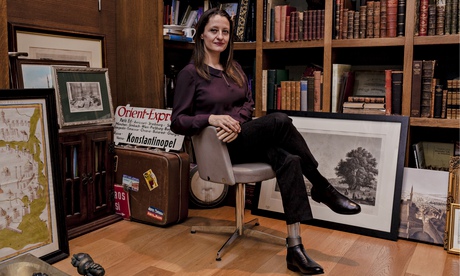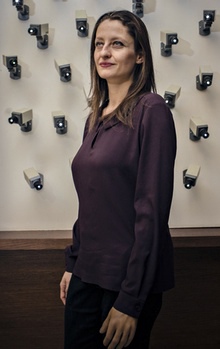Türkçe için buraya tıklayın: Şafak Pavey’in pantolon mücadelesi Observer’da
Safak Pavey is the first disabled woman to be elected to Turkey’s parliament. But the opposition MP finds the country’s obsession with women’s bodies frustrating.
 Safak Pavey photographed at the Point hotel in Istanbul for the Observer.
Photograph: Guy Martin/Guy Martin/Panos for the Observer
Safak Pavey photographed at the Point hotel in Istanbul for the Observer.
Photograph: Guy Martin/Guy Martin/Panos for the Observer
Safak Pavey is not a conventional parliamentarian. When she visits towns all over Turkey, she arrives in the battered family car. Instead of bodyguards and a driver, she is often accompanied by her mother, one of Turkey’s most famous and courageous investigative journalists, Ayse Önal.
Before entering parliament, she worked for the UN High Commissioner for Refugees (UNHCR), campaigning for refugees and human rights all over the world. After living abroad for 15 years, Pavey accepted an offer to stand in the 2011 elections because she was concerned about the direction her country was taking. Freedom of expression, women’s rights and minority rights were all in decline. According to official statistics, reported violence against women had risen 14-fold compared to 2002.
“There was a big gap between what was happening on the street in Turkey and the image of the country portrayed to the outside world.”
Pavey, who lost her left arm and left leg in a train accident when she was 19, became the first disabled woman ever to be elected to the Turkish parliament. She now represents Istanbul Province for the main opposition Republican People’s party (CHP).
Almost three years on, she is more concerned than ever. “I cannot believe the things that are discussed in the public debates,” she says. “Should pregnant women be walking on the street or not? Should girls and boys be in the same classroom or not? These are the debates that we are currently having.”
Her entering parliament, where the dress code for women was a suit with a skirt, triggered a months-long discussion about, as she says “only my name and my prosthetic leg. I was absent from a debate I had not initiated and that I didn’t want.”

“Priority is placed on the chastity of women. You can be corrupt, or a murderer and still hold your head up high on the street without problems, whereas if there are any suspicions of your chastity and moral behaviour as a woman, you get lynched. And if you question this as a female MP, you get lynched all the same.”
In 2012, Pavey made a parliamentary inquiry about the gender separation of university dorms. Pro-government newspapers immediately started a vicious smear campaign against her, calling her an “immoral woman” who promoted “boys and girls sleeping in the same rooms”. She started to receive insulting, sometimes hateful, messages; radical religious groups threatened her.
Melik Birgin, a leading member of a local AKP youth branch, sent her a tweet from his official Twitter account, saying: “Allah took one of your legs and you haven’t woken from the sleep of blasphemy. What is it with your stubbornness?” Pavey wrote an open letter to the prime minister, urging him to remove Birgin from his post. Erdogan complied.
She is a tireless campaigner for the rights of disabled people in Turkey – according to latest estimates, their number stands at around 12 million, from a total population of 74 million – who still face enormous obstacles in all aspects of daily life. Families still hide members with disabilities as a source of shame. There are almost no facilities for disabled people at all, and government promises to supply them advance at a snail’s pace.
“[Birgin’s removal] sent a signal that such words of hate are not acceptable. But these examples should increase. It’s a start, but of course by far not enough compared to the levels of discrimination faced by millions of people every day in this country.”
She adds that many other minority groups, such as LGBTs or religious and ethnic minorities, suffer similar attacks at all levels of Turkish society. A new law against hate crime that in its current form includes the protection of a person’s religion, ethnicity and gender, but still excludes sexual orientation, was announced by Erdogan as part of a democratic reforms package last year, but it has still not been implemented. Pavey says she wants to keep fighting for what she thinks is crucial. “Many female politicians get intimidated by the aggressive behaviour of men. I don’t. Not because I am a courageous person or anything, but because I see international standards and I see that they are worth fighting for.”
